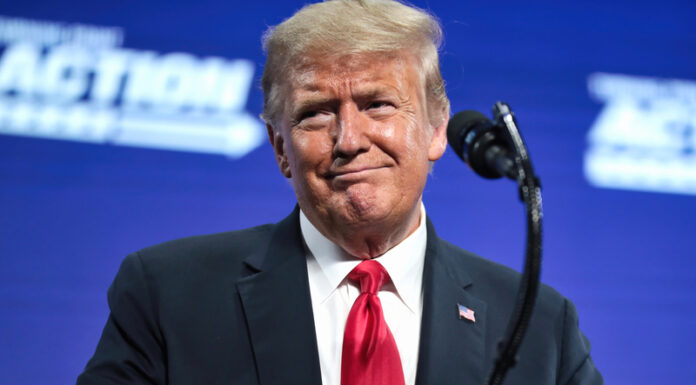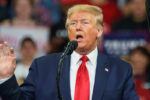According to a report released Thursday, the White House has tasked the United States military with developing various strategies concerning the Panama Canal, including the possibility of seizing control of the crucial waterway.
This directive follows President Donald Trump’s announcement to Congress, stating his intention to take control of the 50-mile canal to “further enhance our national security.” Trump declared, “My administration will be reclaiming the Panama Canal, and we’ve already started doing it.” Options under review range from ensuring secure passage for U.S. vessels to potentially reinstating full American ownership of the waterway, which the U.S. built in the early 1900s and gradually transferred to Panama in the 1970s.
Unnamed officials informed NBC News that deploying troops to seize the canal is considered a “less likely” course of action, but it remains an option. Officials noted that the level of cooperation from the Panamanian military will be crucial in determining whether military intervention is necessary.
Panamanian officials responded stating,”Our sovereignty over the Panama Canal is absolute and not the basis of any negotiation.”
The Trump administration’s interest in regaining canal control appears driven by concerns over Chinese influence in the area. The President has claimed that Chinese forces are “controlling” the canal and that Panama is overcharging the United States for its use. Both China and Panama have denied these claims.
Panamanian President José Raúl Mulino dismissed Trump’s assertions as “nonsense” and rejected any notion of relinquishing control of the canal. “It’s impossible. I can’t negotiate,” Mulino said when questioned in January about ceding control. “That is done. The canal belongs to Panama.”
Military options under consideration include securing existing ports, constructing new ones, or deploying the Army Corps of Engineers to manage the canal’s locks. Discussions have also touched on reopening Army Jungle Schools or establishing training camps similar to those that existed before the canal’s official transfer.
The White House contends that stationing U.S. troops in Panama could counteract China’s regional influence. In a regional conflict, such forces might prevent Chinese vessels from accessing the waterway. The United States currently has over 200 troops in Panama, including Special Forces, collaborating with Panamanian security forces.
Secretary of Defense Pete Hegseth is scheduled to visit Panama next month to discuss increasing the U.S. military presence in the canal area. The administration claims that the United States has the right to ensure free navigation through the Panama Canal, a critical route for international trade.
It is pertinent to note that Panama’s constitution guarantees the canal’s neutrality. The United States and Panama are treaty-bound to defend the canal against threats to its neutrality, with both nations authorized to take unilateral measures if necessary.
While China ranks as the second-largest user of the Panama Canal, experts have found no evidence that the Chinese government controls or operates it. The canal is managed by the Panama Canal Authority, a Panamanian government agency. Nonetheless, Chinese companies have made notable investments in surrounding ports and infrastructure, raising concerns among some U.S. officials about China’s expanding influence in the region.
A Hong Kong-based conglomerate, CK Hutchison Holdings, has long held a concession to operate major port terminals at the canal’s entrances on both the Atlantic and Pacific sides (Cristóbal and Balboa ports). This arrangement means a Chinese-affiliated company manages cargo handling at these ports, which some U.S. officials consider strategically significant. However, Panama’s government maintains that these commercial operations are separate from canal traffic or toll management. Both Panama and China deny any Chinese operational control over the canal itself.
Reputable sources support this stance. Reuters reports, “There is no evidence to support” Trump’s claim of Chinese control, clarifying that while Chinese investments are substantial, they do not equate to running the canal.
A significant portion of vessels navigating the canal either head to or originate from the United States. Should the canal be blocked or its operations disrupted, ships traveling between the Atlantic and Pacific Oceans would need to reroute around South America, substantially increasing time and cost for global shipping.
Last month, Secretary of State Marco Rubio visited the canal, claiming to have secured a deal allowing U.S. ships toll-free passage. Mulino quickly refuted this, with Rubio later clarifying that these were merely his “expectations” rather than a formal agreement.
The small Central American nation has historically been a steadfast U.S. ally since former President Theodore Roosevelt first recognized its independence in 1903. Current tensions mark a shift in what has generally been a positive relationship between the two countries.
Any military action to seize the canal would likely breach international law and could strain U.S. relations with Panama and other regional nations.
Multiple reputable outlets have confirmed that U.S. officials informed Reuters of an interim national security directive instructing the Pentagon to ensure “full access” to the canal and consider military options for its protection. U.S. Southern Command (SOUTHCOM) has developed options ranging from enhanced partnerships with Panama’s security forces to the less probable scenario of U.S. troops seizing the canal outright. Admiral Alvin Holsey, SOUTHCOM commander, has presented draft strategies to Defense Secretary Hegseth.
The Panama Canal was completely transferred to Panama at the end of 1999, and Panama assumed full sovereignty over it. However, the treaties also include the Panama Canal Neutrality Treaty, which mandates that the canal remain neutral and accessible to ships from all nations post-transfer. If the canal’s neutrality or operations are threatened, either country can act to ensure it stays open for international shipping.
U.S. officials sometimes cite this treaty to justify potential roles in safeguarding the canal. However, the treaty explicitly does not allow the U.S. to interfere in Panama’s internal affairs or to permanently station troops to manage the canal. A provision known as the DeConcini Reservation in the U.S. ratification clarifies that while the U.S. can act unilaterally to defend the canal’s neutrality, it cannot undermine Panama’s sovereignty or territorial integrity.
Any U.S. military action is only permissible to counter threats to the canal, not to assert ownership. For instance, if the U.S. attempted to invade Panama to “take back” control of the canal absent a neutrality threat, that would almost certainly violate international law and treaty terms.
Legal experts and U.S. allies acknowledge that such actions would violate Panama’s sovereignty and the UN Charter. Any move by a foreign power, including the U.S., to seize the canal by force would be illegal and not sanctioned by the treaties.
The Panama Canal remains one of the most crucial waterways for global commerce. It connects the Atlantic and Pacific Oceans and allows ships to avoid the long journey around South America. Its strategic significance has kept it in the international spotlight throughout its history.








